Z for Zachariah Blu-ray Movie
HomeZ for Zachariah Blu-ray Movie 
Blu-ray + UV Digital CopyLionsgate Films | 2015 | 95 min | Rated PG-13 | Oct 20, 2015
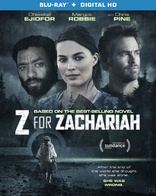
Price
List price:Amazon: $20.99 (Save 16%)
Third party: $20.99 (Save 16%)
Only 2 left in stock (more on the way).
Movie rating
6.3 | / 10 |
Blu-ray rating
| Users | 0.0 | |
| Reviewer | 3.0 | |
| Overall | 3.0 |
Overview
Z for Zachariah (2015)
In the wake of a disaster that wipes out most of civilization, two men and a young woman find themselves in an emotionally charged love triangle as the last known survivors.
Starring: Chiwetel Ejiofor, Margot Robbie, Chris PineDirector: Craig Zobel
| Thriller | Uncertain |
| Sci-Fi | Uncertain |
| Drama | Uncertain |
Specifications
Video
Video codec: MPEG-4 AVC
Video resolution: 1080p
Aspect ratio: 2.38:1
Original aspect ratio: 2.39:1
Audio
English: DTS-HD Master Audio 5.1
Subtitles
English, English SDH, Spanish
Discs
50GB Blu-ray Disc
Single disc (1 BD)
UV digital copy
Packaging
Slipcover in original pressing
Playback
Region A (C untested)
Review
Rating summary
| Movie | 3.0 | |
| Video | 4.0 | |
| Audio | 4.0 | |
| Extras | 2.0 | |
| Overall | 3.0 |
Z for Zachariah Blu-ray Movie Review
Don't they know it's the end of the world?
Reviewed by Jeffrey Kauffman October 19, 2015Fans of cult films may feel they’ve wandered into an alternate version of the 1959 apocalyptic drama The World, the Flesh and the Devil as they watch Z for Zachariah. In both films a young Caucasian woman thinks she’s the sole survivor of some kind of end of the world fracas, only to be startled when a black man suddenly shows up. A halting friendship ensues, which in turn is interrupted by the arrival of a third individual, a white man. While changing which character it’s in reference to, Z for Zachariah also has one of the survivors having emerged from a cave, a place whose refuge in fact aided his very survival, a salient (if tangential) plot point in The World, the Flesh and the Devil as well. Other plot points between the two films diverge significantly, but both share a somewhat intellectualized, occasionally languid, approach toward what is often a subject matter handled in a fairly florid manner.
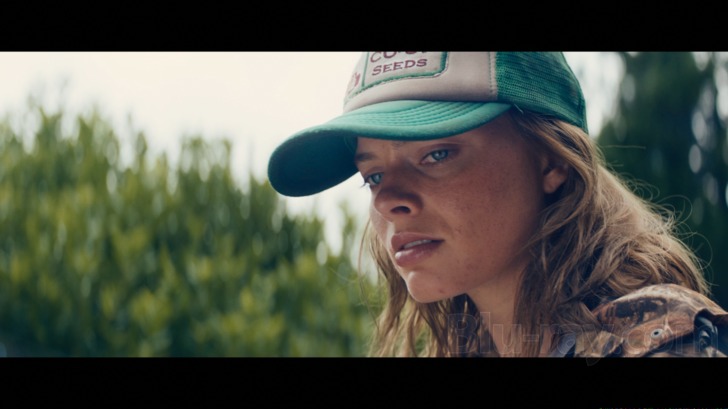
There’s a kind of interesting dichotomy at play in various post-Apocalyptic dramas, wherein some films (like On the Beach and The World, the Flesh and the Devil itself) take a fairly intellectual approach toward the admittedly disturbing subject, while others (like the Mad Max Anthology) tend to go for the gusto, doling out at least as much mayhem and action- adventure as any high-falutin’ conceptualizing about what life in a decimated environment might be like. Z for Zachariah falls pretty resolutely into that first category, and in fact some audience members may be nonplussed by the film’s kind of laid back, elegiac tone, one which tends to let the narrative play out in fairly broad dramatic strokes, without much in the way of overt conflict ever entering the fray.
There’s in fact very little hint that Z for Zachariah is actually trafficking in more typical post-Apocalyptic tropes in its early going, though there are hints that something isn’t quite right in its depiction of Ann Burden (Margot Robbie), a young woman who is evidently living alone in a rather beautiful little valley that sports her home and rustic white clapboard church. It soon becomes apparent, though, that Ann is living in some kind of highly irradiated environment, one which her sylvan valley has evidently shielded her from. The radiation angle becomes even more obvious when Ann is foraging out and about one day and stumbles across a cart left on a roadway, and then soon sees an individual in a radiation suit taking readings from a Geiger Counter. The individual figures out that the air is not lethal, and removes his suit joyously. Ann stays hidden, obviously shocked that there is another survivor tooling about the wilderness. However, her moral instincts overcome her fear when she sees the man bathing in a natural pool, and screams at him that the water supply comes from outside of the valley, meaning of course that he’s just exposed himself to potentially lethal doses of radiation.
Ann manages to pull the guy through a rehabilitation process, finding out that his name is John Loomis (Chiwetel Ejiofor), who was an engineer working in an underground bunker when the unspecified hostilities broke out. Loomis’ return to health is halting, but his knowhow immediately leads to a number of breakthroughs for Ann, including finding out that she can continue to fill her farm tractor with gas when Loomis instructs her how to convert the pumps at a nearby station to manual operation (since there’s no electricity). That scene sets up a really weird little moment where Ann is down at the gas station and begins manically gesturing to Loomis (who's still recovering and is more or less stuck back at the farmhouse) that she’s succeeded, and the scene then cuts to Loomis spying Ann through the scope of a rifle. Though the need for Loomis to do that is fairly quickly explained, it sends a jolt of subliminal energy through this early going that I’m not so sure is helpful to the film’s otherwise fairly languid tone. It in fact suggests Loomis is maybe up to no good (perhaps going so far as to indicate a murderous intent), but if it is indeed a kind of low level foreshadowing, it’s both too obvious while also being off topic in at least one salient way.
The relationship between Ann and Loomis grows friendlier, and Ann ultimately comes to believe that the two will need to be responsible for repopulating the earth. Perhaps surprisingly, Loomis is reticent to proceed, and soon things become even more precarious when Ann, out again on another forage into the wild, meets another survivor, a white man named Caleb (Chris Pine). Suddenly, there’s a bizarre and awkward ménage à trois of sorts, where Loomis, once the default “choice” for Ann finds himself shunted somewhat to the sidelines, even as the three decide to work together to build a generator of sorts.
Despite certain brainier outings like the aforementioned On the Beach, the post-Apocalyptic subgenre tends to be the refuge of a more florid sensibility, one that often undercuts its premise simply by dint of the fact that it’s so exaggerated. The ironic thing with regard to Z for Zachariah is that it may in fact be too subtle for its own good. This is an unapologetically slowly paced film, one that plays out in a number of vignettes between Ann and Loomis in the early going, and then Ann, Loomis and Caleb in the second half of the film. Screenwriter Nissar Modi and director Craig Zobel seem less interested in really getting into the science fiction nuts and bolts of the story than in slowly but surely detailing the interior worlds of the three characters, and how those spill out into interrelationships in a fractured and yet unavoidably intimate environment. The tension in the film, therefore, is largely subliminal, never really bursting forth into overt displays, something that keeps the dramatic momentum perhaps deliberately tamped down most of the time.
If Z for Zachariah is a bit lacking in actual dramatic force (some of which is surely by intention), on a performance level it's often a quite arresting experience. This is a so-called "three hander", (and in fact for the bulk of the opening, it's a "two hander"), and all three actors create completely believable and at least relatively relatable characters. This film takes a completely different path in its wind up than The World, the Flesh and the Devil did, suggesting that the old adage about "two's company and three's a crowd" may be truer than ever in a post-Apocalyptic universe.
Z for Zachariah Blu-ray Movie, Video Quality 
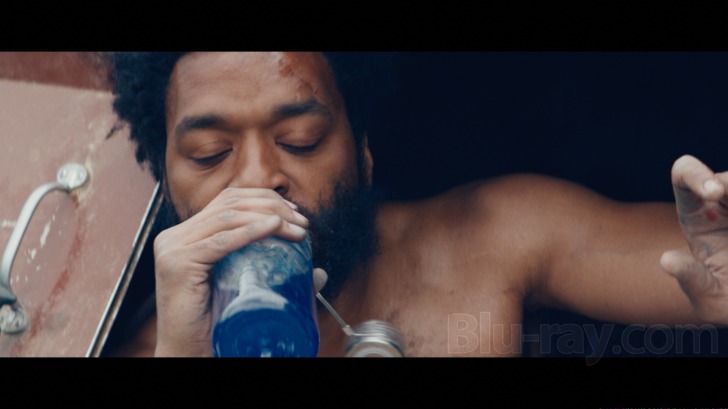
Z for Zachariah is presented on Blu-ray courtesy of Lionsgate Films with an AVC encoded 1080p transfer in 2.38:1. Show with the Arri Alexa Plus (according to the IMDb), this is nevertheless just a slightly soft looking enterprise quite a bit of the time, a proclivity fostered both by the handheld, quasi-jiggly cam sensibility on display quite a bit of the time, as well as tendency on the part of director Zobel and cinematographer Tim Orr to shoot into light, a choice which often bathes the image in elements like lens flares and effulgent halos, as well as what appears to be boosted brightness and contrast. In steadier camera moments, and in normal lighting, the image is sharper and better defined, and even in some of the scenes where background light suffuses the frame, fine detail can be excellent (look, for example, on the fine threads poking out of the top of Ann's sweater in screenshot 6 for a good example). The palette is a bit on the ruddy side here, with deeper tones than one might expect in a typical post-Apocalyptic drama. The cutaways to serene outdoor footage often feature beautiful depth of field and commendable precision in elements like swarms of leaves.
Z for Zachariah Blu-ray Movie, Audio Quality 
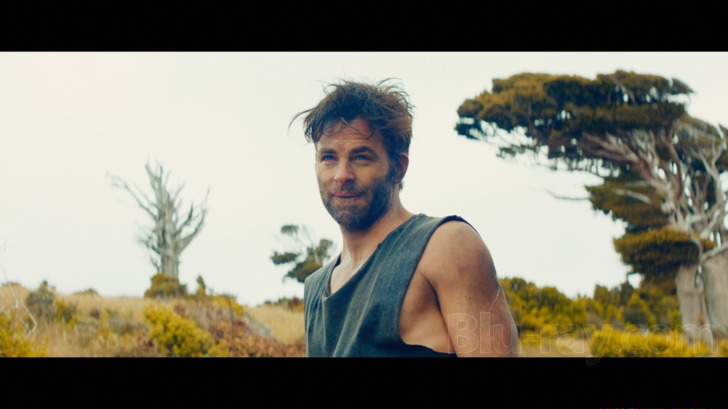
Z for Zachariah's lossless DTS-HD Master Audio 5.1 mix is often a quite subtle affair, eschewing the bombast of post-Apocalyptic outings like Mad Max: Fury Road in favor of a much quieter ambience that offers a spacious, quite lifelike, accounting of the sylvan glade where Ann has managed to survive. Ambient environmental effects dot the surrounds, and a lot of the early going in the film plays out almost like a pastoral Merchant-Ivory offering from a sound design perspective. There are a few bursts of energy along the way courtesy of elements like a nearby waterfall (where Loomis first becomes sick), but overall this is a somewhat restrained mix that offers consistent if unobtrusive immersion. Dialogue is very cleanly presented and is well prioritized on this problem free track.
Z for Zachariah Blu-ray Movie, Special Features and Extras 
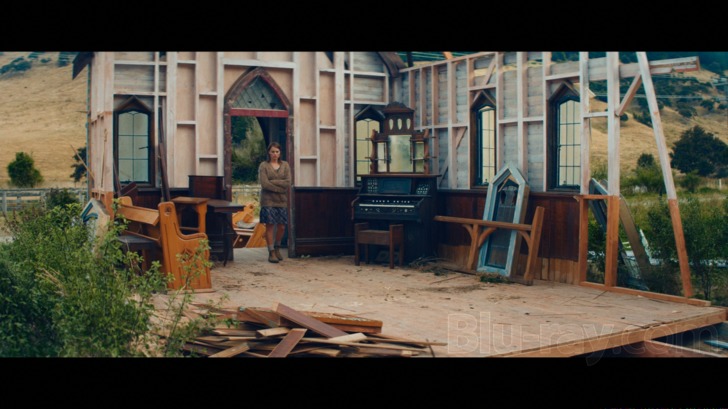
- The Making of Z for Zachariah (1080p; 11:28) is pretty standard EPK fare, with behind the scenes footage, interviews and snippets from the completed film.
- Deleted Scenes (1080p; 6:00)
- Extended Interviews (1080p; 20:14) include:
- Craig Zobel - Director
- Margot Robbie
- Chiwetel Ejiofor
- Nissar Modi - Writer
- Z for Zachariah Trailer (1080p; 2:33)
Z for Zachariah Blu-ray Movie, Overall Score and Recommendation 
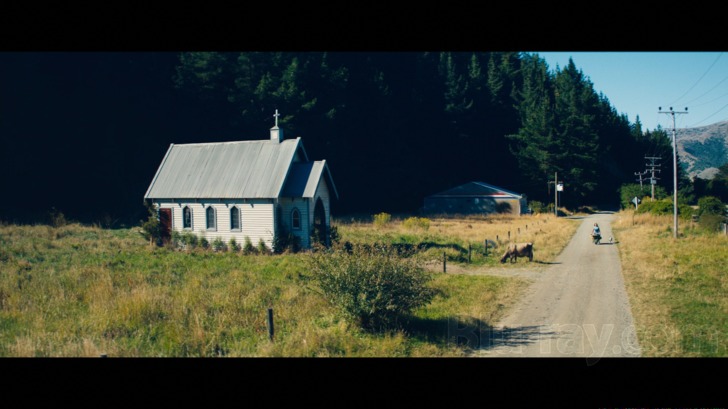
Z for Zachariah is often intellectually engaging, but it rarely really touches the heart, despite some passing attempts when the characters' back stories are addressed. Probably best appreciated as a showcase for its three nicely modulated performers, Z for Zachariah at least has the courage of its (pretty quiet) convictions. Technical merits are generally strong, and Z for Zachariah comes Recommended.
Similar titles
Similar titles you might also like

Syrup
2013

The Informers
2008

Into the Forest
2015

Panic in Year Zero
End of the World / Survival
1962

When Worlds Collide
1951

The Road
2009

I Think We're Alone Now
2018

Testament
includes "Number Our Days" (1976) and "In Her Own Time" (1985)
1983

The Trigger Effect
1996

The Canyons
Slipcover in Original Pressing
2013

After the Dark
2013

Radioflash
2019

Crack in the World
4K Restoration
1965

The Wave
Bølgen
2015

Melancholia
2011

Goodbye World
2014

Land
2021

Traffik
2018

The Handmaid's Tale: Season One
2017

Threads
Standard Edition
1984